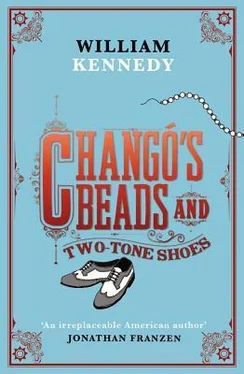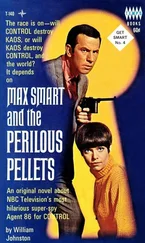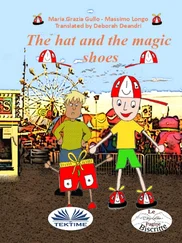Quinn saw Inez coming along the aisle toward them, in heels and a dark blue dress, her hair in a tight coif, a new image, not glamorous, but smart and sleek, befitting a casino hostess. She smiled at them all and said through her teeth, “Get out of the club now. Right now. Something is happening. Go. Go.”
And so the three stood and walked casually out of the nightclub and Quinn pressed the elevator button in the foyer where two men in suits and neckties, one of them Javier from the garage, were playing slot machines. Javier saw them and turned his back, dropped a coin into the slot, and pulled the handle. As the elevator door opened, the slot machine rang its bell and delivered a rattle of coins which Javier made no move to retrieve. He popped another coin. Then the elevator door closed on the trio.
Did five minutes pass? Ten?
They were in the Buick when Colonel Quesada and Lieutenant Colonel López from the SIM, with his aide Captain Godoy, and their three wives, the men in civilian clothes, the wives in dinner gowns, entered the foyer from the casino. As the captain summoned the elevator, Javier and his comrade took machine pistols from under their suit coats and shot Quesada first, then López, also hitting both women who, in terrorized flight, collided with their own mirror images and slumped. One bullet grazed the necktie of the captain, who snatched the pistol from López’s shoulder holster and fired at the shooters. But by then they were out of sight, on the run toward the casino’s rear exit onto Calle 25.
When they reached the Nacional Alfie called Inez to find out what Javier and his comrade had wrought. It was chaos: López and the women wounded, Colonel Quesada executed with such extreme suddenness that he did not yet know he was dead.
At the hotel bar Alfie toasted Javier with daiquiris and Renata recapitulated the killing — carried out by Javier of the 26th but with guns from the Directorio — a refreshed alliance of the groups that had been working for the same cause, warily independent of each other. If the Directorio had killed Batista, Fidel would now be irrelevant. At the garage Aurelio had said the guns he was buying would go mostly to Fidel, a gift from the Directorio in exile. Renata had asked him then, “What of all the guns Diego and I put in the Sixteenth Street apartment?”
“Still there, but we have nobody to get them.”
Renata remembered how Alfie’s mouth had tightened with functional hatred when he said he would shoot Quesada in the face. Alfie was a crazy one, and he might help us bring out the guns. She would find money somewhere to pay him. She would give the guns to Fidel as another gift. Yes, Alfie would do this and Quinn would help. They would all talk about it. There was a bond among the three of them. Quinn did not seem afraid. They left the hotel and she watched him as he drove, memorizing his face.
“You must find a place to stop, out of the light,” she said.
“Are you all right? Are you ill?”
“No, just stop.”
Quinn parked on a dark street and looked at her staring at him. She leaned toward him.
“Love me, Quinn,” she said.
“I will,” he said, “I do.”
Then, with their first touch of love since they’d met, he embraced and kissed her, and she crawled inside him.
“Love me,” she said.
“I will. I will love you. I love, I love Renata.”
“Love me, lléname, fill me.”
“Yes,” he said, “I can do that.”
Struck by the brilliant light of the enabling moon, Quinn spiraled everything he knew about love into the center of this divine woman. At this sudden onset of joy he heard Narciso chanting:
“The dead surround him and claim him as their own.
He wears the dead like the beads of Changó.”
Quinn received the music and his pulse skipped a syncopated beat.

At Quinn’s apartment they stopped making love at three in the morning, not because they were finished, they were only beginning; but it came to Quinn that if Renata really did want to go home for her own Changó beads and to see her parents, this was the time. Checking out the home of a museum guide who knew a dead rebel would be low priority on the night the police and the army were out in major numbers tracking the two killers of Fermín Quesada. Renata said Quinn’s suggestion was perfect and they would not even have to park near her house. They could park on the next street and keep hidden by tall bougainvillea the whole length of her garden, and go in through the French doors to the house.
From the bougainvillea they saw no one, only the light in Renata’s kitchen, and just before four o’clock they entered her home like burglars. She took Quinn to the living room and he sat alone with the light from a street lamp glinting on the crystal chandelier, the huge silver punch bowl, and large silver-framed photos he could barely see but presumed were her parents. As he gained power over the darkness he saw a painting that demanded his gaze — a full-length albino figure, faceless except for cutout eyes, embracing a black figure with a hidden face, the albino holding a fish that was grinning like a devil. The figures were overlain with strands of seaweed, and the image haunted Quinn. He remembered a similar painting in the Bellas Artes, obviously by the same artist, illuminating the grisly myth of Sikan, who was beheaded for revealing the secret of the god Tanze; and in days to come Renata would tell him the grislier tale of the painter herself, dead of suicide.
Renata had gone quietly upstairs to her mother’s bed, knelt beside it and whispered “Mami,” then shushed her mother and held her arm so she would not move it and wake her sleeping husband. She backed away, beckoning her mother, and they retreated to Renata’s room where she delivered a capsule history of two days of death, terror, and fear of the police who wanted to interrogate her as the friend of a Palace attacker. I knew him only through his painting, Mamita, it is such a tragedy. I am all right, as you can see and I have Esme’s car and I have a friend downstairs, an americano who helped me, and we’re going to Cárdenas to stay with Tía Gabriela, but you must tell no one where I am or they will come and arrest me. I need clothes and money, Mamita, and don’t tell Papa or he will be furious and think I’m in politics. But the politics are not mine; they belong to an artist I knew who is dead.
While her mother went to get money Renata pulled from under her bed the large cardboard box where she kept valuables and letters. She took out the red and white Changó beads and put them around her neck. She uncovered the three pistols she kept in the box, put two back and kept the Colt Cobra.38, which she wrapped in her underwear and put in the suitcase along with blouses, skirts, makeup, hairbrush, toiletries, and the bottle of perfume, Gardenia, that Alejo Carpentier gave her.
Her mother sat on the bed by the suitcase and handed Renata six hundred dollars in cash, all she had in the house. Renata said that’s wonderful, tell Papa I love him and I will call, or maybe someone else will call and say the clock is fixed, which will mean I am all right.
“Natita,” said her mother, “you are a problem child and you do not tell the truth. I won’t ask what this is about for it will kill me if it is what I think it is, and kill your father before it kills me. You have a second life. One life is not enough for you. You are the strangest child and I love you for that, but be careful with your precious life and do not be crazy. Now take me down to meet your American. Is he Catholic? Does he have money?”
Quinn instantly recognized Renata in her mother’s beauty, obviously a genetic gift to this family. Even in her tightly clutched silk robe she had the elegant, lustrous look of a silent movie vamp — Dolores del Rio came to mind.
Читать дальше













